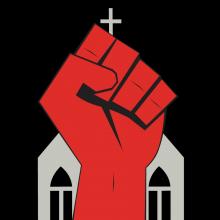Church

Tyler Woolstenhulme might be loath to admit it, but sometimes he’s not paying attention in church. He will happily confess that he’s not the only one.
The 31-year-old Mormon has more than once sat in the pew of his congregation in Sandy, Utah, and let his mind wander. When that happens, he pulls out his iPhone and sometimes plays his puzzle game, “1to50.” Or maybe he texts his friends across the aisle.
“I take the time in church to catch up with people I haven’t contacted in a while,” he said. “I text friends or family.”

Several of my college buddies should work for Daniel Tosh. They have the uncanny ability to scour the Internet and find the most obscure and outlandish videos. Recently, one of my buddies posted a video called Bibleman. My eyes and ears could only withstand a few minutes before I determined my soul might wither away. I assume this was just one video in an entire series. Even more disheartening is the fact it was put out by a church.
Here is, yet again, a case where the church, in an attempt to imitate culture falls short. The result is that they wind up excelling in mediocrity. Granted, I'm sure that's not the goal of any church, but sadly mediocrity is what most seem to offer. My hope is that this comes across as an open dialogue in how we can better proclaim the message of Jesus instead of a bitter rant directed toward the church.
We all realize that a copy is never as good as the original. Unfortunately, we have a difficult time grasping this truth in the church. We have ceased innovating and settled for imitating.

The “secular world” has liars and thieves, adulterers, cheaters, and hypocrites. It’s a place full of child molesters, domestic abusers, and addicts. Where loneliness is rampant, mental illness is on the rise, and individuals routinely try to numb their pain via drugs, alcohol, and sex. Divorce is everywhere, pornography infects the minds of millions, and infidelity occurs on a regular basis.
The church often presents itself as an alternative to the “real world,” a place where these things don’t exist.
Many churches refuse to admit that these problems are affecting them. In reality, there is little statistical difference between Christians and non-Christians relating to these issues. Christians don’t receive a special pass that protects them from experiencing mental illness, suffering, struggling with addiction, abusing other people, being abused, or failing.
Our faith in Christ gives us hope and strength and courage, but it doesn’t erase reality, and it isn’t meant to create a flawless utopia where we can escape from the world’s problems. But many churches attempt to do just that — trying to create the perception of perfection.
In some church communities, there is the appearance that porn, sexual abuse, and rampant sin don’t exist. Even non-sinful things (mental illness, poverty, etc.) are treated as stigmas that are intentionally shunned. This is often misinterpreted as holiness — it’s not.
POPE FRANCIS HAS created a new environment in the church. Beginning with asking all the people in St. Peter’s Square to bless him, living in a humble apartment and not the papal palace, placing his own phone calls, paying his own bills, giving simple daily homilies, having conversations with many people, and joyfully mingling with people: These all characterize an incredibly different pope. What has been even more attractive about Pope Francis than his style has been what he has said.
Pope Francis is clearly not on a mission to preserve the status quo. He’s been outspoken about the need for change in the world and in the church. In this he has not been a “professional denouncer.” Rather, he always contrasts what needs to change with the opportunity to be so much more than we are now. Whether it is oppressive global economic policy or clerical ambition, Pope Francis points out that we are called to something more noble and satisfying. The call of Christ is to be our best self. Francis reminds us, “God always forgives. Don’t forget this. God always forgives.”
Another striking aspect of Pope Francis is his constant and passionate concern for people who are poor and vulnerable and his reminder of our responsibilities to them. Whether he is talking to world leaders, bishops, or general audiences, his love of poor people and his firsthand knowledge of their challenges and how we should respond is profound.

It is not very difficult to understand why there is a black church and a white church in America today, or to realize that this structure will not change in the near future. The religious atmosphere created by the coming together of blacks (who were slaves) and whites (who were masters) tended to negate any possibility of developing the true unity and oneness that scripture proclaims for the church. The agendas of the slaves were vastly different from those of the masters. Unfortunately, conflict over agendas, both stated and unstated, continues to be one of the reasons that blacks and whites do not come together to worship.

A tech writer’s obituary for PCWorld’s print magazine — part tongue-in-cheek, part nostalgia riff — reminded me that I once devoured that magazine, now kaput.
It was an early lens into the fascinating world of personal computing. Its ads and articles stoked dreams of power and speed.
I soon became part of PCWorld’s dilemma. I dropped the print mag and began seeking tech news on the Internet. It was faster and fresher, had clickable links to other sites, great art, and brevity. PCWorld itself went online.
Much of my world has switched to the Internet. I do most of my banking and bill paying online, shop online, order lunch online, learn choir music online, teach classes online, use email and text messaging extensively, and read the news online.
Nothing unusual in any of that. Such web-centered behavior has become the new normal. Any enterprise that isn’t considering ways to move its operations online is losing its future.
In my world, more and more churches are going web. Electronic newsletters replace mailed paper. Clergy use email to communicate, as do staff and volunteers. Tweets, Facebook posts, e-blasts, and text messages carry word of emergencies. Constituents make donations online.
There’s more. Classes are moving online, as are interviews with job candidates and opinion surveys. Some congregations are experimenting with worship online and small groups. Every Sunday morning, some 600,000 people a minute access Bible verses online using one app.
Expressing her opinion that climate change is no longer about energy efficient behavior but rather about national policy, spiritual leader Marilyn Sewell argues the importance of what it takes to preserve the Earth’s atmosphere. Expressing her concerns about the lack of community and church involvement, Sewell insists policy immersion is crucial toward resolving future matters surrounding climate change. The Huffington Post reports:
So where is the parish church in all of this? Mostly silent, it seems. Churches continue to be concerned with individual sin as opposed to systemic sin, even in regard to climate change. Congregants may be admonished to recycle and change their light bulbs, but not to become politically active. The fact is we're way beyond changing our light bulbs. We need to bring that unhappy, startling truth to the pulpits of our land.
Read more here.

Carolyn Winfrey Gillette, a pastor who is a foster mother to a four year-old African American boy, wrote this hymn after George Zimmerman was found not guilty for his shooting of Trayvon Martin. She had read Jim Wallis’ “Lament from a White Father” and heard the Rev. Otis Moss of Chicago's Trinity United Church of Christ interviewed for the NPR report, “For The Boys Who See Themselves In Trayvon Martin.”
We Pray for Youth We Dearly Love
O WALY WALY LM (“Though I May Speak”)
Solo (optional young voice):
“If I should die before I wake,
I pray thee, Lord, my soul to take....
And if I die on violent streets,
I pray thee, Lord, my soul to keep."
(Continued at the jump)

Summertime is "revival season" for Christians of various denominations. Traditionally revivals, or "Great Awakenings", have preceded most major movements in American society, like the Revolutionary War and the Civil War. Revival involves not only a supernatural outpouring of the Holy Spirit but an intense time of confession, repentance, and crying out to God to make us and our communities right.
This summer will mark two major Civil Rights anniversaries: the 50th Anniversary of the March on Washington and 58th Anniversary of Emmitt Till’s death. It is my belief that providence provides us with divine appointments that can be overlooked as coincidences if we do not have the spiritual eyes to see. This summer appears to be one of those times of divine appointment.
The American Church has never truly mourned and repented of its original sin of racism, and sadly this sin has infected the Body of Yahshua (Christ) globally.

The Christian church is full of Christians, right?
Sadly, the answer you'll get to that question is heavily dependent on whom you are asking. Certainly, the church should be seeking to follow Christ, seeking to follow the teachings of Jesus. However, increasingly, there are those who claim the church is full of hypocrites. They are not saying the church only has hypocrites. That's clearly not true. They are simply pointing out there are surprisingly high numbers of people going to church, calling themselves Christians but whose actions run counter to what Jesus taught. I believe we can do better.
WHEN CECIL WILLIAMS was 8 years old, he imagined murdering a police officer. It’s a jarring way for an influential minister to begin a memoir about radical hope and perseverance. But in a short lifetime of intense oppression, Williams had already internalized heartbreaking lessons of systemic injustice and the righteously violent tendencies that can follow. The budding young leader already nicknamed “Rev” and wise beyond his years also knew that if he could imagine brutality, he could envision a transformed society.
“Imagination is one of the most penetrating and incendiary forces I’ve ever experienced,” he writes in Beyond the Possible: 50 Years of Creating Radical Change at a Community Called Glide, co-authored with his wife and longtime collaborator, Janice Mirikitani. Building on their shared vision over a remarkable half-century, they lead what might be the most exuberant congregation in America. Glide Memorial United Methodist Church and the Glide Foundation are inextricable, legendary San Francisco institutions, the latter one of the city’s largest social service providers and the real-life shelter featured in the 2006 biopic The Pursuit of Happyness.
Writer Dave Eggers sums up Glide in the book’s introduction with a simple but uncomfortable truth: There are very few places in society where someone is not left out. Houses of worship are supposed to make a dream of inclusivity possible, but even the most inspiring visionaries live and lead imperfectly. Eggers proposes that because of the unconditional love necessary for a lasting marriage between two seemingly incompatible leaders—Williams, a black Texas minister with a solid upbringing, and Mirikitani, an agnostic Japanese-American poet from a broken, abusive home—Glide is one of the few radically accepting places where true unconditional love is practiced like the most dogmatic of faiths.

A few months ago, Stephen Marsh, my fellow pastor, and I walked into Chief’s Tavern on the east side of Madison, Wis., ordered a couple pints, sat on a pair of stools and discussed an idea that would eventually have a massive impact on the congregation we serve together. In specifics, we wondered whether we could spark a ministry by fusing two of our most treasured Lutheran traditions: beers and hymns.
The budding idea, which originated from some creative faith communities in other parts of the country, was to find a local tavern willing to host a monthly one-hour session of hymn-inspired evening fellowship. Within a few minutes of our conversation, we were joined by Brian Mason (owner of Chief’s Tavern), and what followed was a ground-breaking partnership between parish and pub. The first Beers & Hymns event was scheduled, and as the date drew closer, our collective thoughts and prayers moved back and forth between “Thanks be to God” and “Lord, have mercy”!

Editor’s Note: As we continue reporting on the important topic of sexual abuse and violence, Sojourners has opened up the Sexual Violence and the Church blog series for submissions. This piece is one such submission. If you are interested in submitting a post for the series, please email the Web Editor HERE.
"From the beginning …" began my pastor, rising slowly from his armchair. With his next words, he broke my world apart. From the beginning, he had been attracted to me as a woman. From the beginning, his interest in me had been personal. He told me the reasons why, and then he said these words: "If we were both single, and if I weren't your pastor, we'd be going out to dinner." He paused a long beat. “And we’d see where it went from there."
Were my pastor's words an act of sexual violence?
When we hear the words "sexual violence," we may envision a forcible rape or a sexual act with a person incapable of consent. Many of us would consider unwanted groping or uninvited embraces to be acts of sexual violence. Some of us would include "consensual" sex between persons of different rank, because we understand that power disparity makes meaningful consent impossible. But what about the manipulative behavior that gives rise to the delusion of consent? Was my pastor's not-quite-a-proposition an act of sexual violence? Could a lingering handshake, a compliment on spiritual gifts, or an offer of pastoral support be acts of sexual violence? Most of us would say no. And most of us would be missing the boat.
TWO YEARS AGO, Jeff Chu found himself at a crossroads. Like many gay Christians, he felt disconnected—condemned by a wide swath of his fellow believers because of his sexual orientation, questioned because of his faith by some in the LGBTQ community who have been pushed out of the church by the words and actions of many Christians. To top it off, there was that lingering doubt, so common among those raised in evangelical households: Does Jesus really love me?
To answer that question, Chu—an award-winning writer for Time, The Wall Street Journal, andCondé Nast Portfolio and the grandson of a Southern Baptist preacher—took off on a yearlong cross-country pilgrimage, “asking the questions that have long frightened me.” What he encountered was a divided church, “led in large part by cowardly clergy who are called to be shepherds yet behave like sheep.”
Many of the pastors Chu contacted for the book refused to speak with him, citing their suspicion of him as a member of the so-called “‘liberal media elite’” or stating bluntly that engaging on such a controversial issue might jeopardize funding for a pet project. After speaking with Richard Land, then-president of the Ethics & Religious Liberty Commission of the Southern Baptist Convention, and David Shelley, a Baptist minister from Tennessee affiliated with the Family Research Council, Chu concludes that they “devote much more time talking about legislation than about love.”
Then there are those he interviewed who are known more for screaming than talking. In meeting with members of the infamous Westboro Baptist Church, Chu does not shy away from controversy—or his own fears. “Some nights before my departure,” he recalls of the days before his trip to Kansas, “I had nightmares, and many mornings I’d wake with my jaw tight and teeth clenched.” His encounter with Rev. Fred Phelps, the grizzled, homophobic pastor of the church, is perhaps the most riveting of the book, culminating in a surreal, grudging offer of friendship from Phelps.

THE FUNCTION of healthy religion and church is to provide individuals and society with a collective container that carries the objective truth of reality for individuals. The Great Truth is too grand and transcultural to be entrusted to the vagaries of individuals and epochs. Otherwise, society becomes a massive runway for unidentifiable flying objects—each claiming absolute validity and turning their subjectivity into the only sacred.
The ground for a common civilization and shared values is destroyed if our religious experience is basically unshareable or without coherent meaning. We end up where we are today: pluralism without purpose, individuation but no community.

Mumford and Sons opened with a little introit called "Sigh No More" then a call to worship, "Roll Away Your Stone" and so we did. Understated and, dare I say it, reverent. Polished and yet still "honest" (this is a hipster liturgy, after all), the boys did a great job offering their work to us. They spoke with the audience. Marcus jumped off stage to give a beer to a woman celebrating her 21st birthday and then led the crowd in singing "Happy Birthday" to her. Welcome to a living room that seats 8,500.
The band played most of their published stuff, took a bow, and walked off stage. The encore set is what took it home for me. The stepped away from their usual set-up, unplugged their instruments, stood around a condenser mic and then sang. They dragged us back into devotion. Springsteen's "I'm On Fire" followed by "Sister" sung a cappella did me in. A benediction? Perhaps I'm reaching.
They closed the night with "The Cave" which had people jumping and singing along. You can find a set list here.
After the concert, my Facebook feed lit up with "it was just like church" or "that was church" by several people including some ordained church types in attendance last night. The Vineyard background has not been wasted, not by any stretch. It has been given a new venue, a new form, a venue where the truth can be sung in quiet tones, where no name is taken in vain or otherwise, where wild passion is replaced with festal devotion.

I have spent much time blogging out of frustration with the church, gnashing my teeth over the church’s shortcomings. Some have called this negativity. Some have asked me to be more specific about what I want the church to do. I could not do this before. First, I needed to pinpoint my frustrations and disassemble my previous understanding of church. Out of the rubble of my own disillusionment a vision of something new is beginning to emerge. It is time to share this vision however blurry it may be.
This something new looks like congregations so committed to following Jesus by loving all of God's children that they will pour over their current budget and activities to see what can be altered to make room for greater service to the poor and the outcast. Such churches might come to the conclusion it is unconscionable to pay for the upkeep of a building for the sake of its use a few times a week.
This is a tension-filled topic. As Bergthal made public their intent to disassemble and ultimately tear down their building, many could not understand. For some, there is such a deep attachment to our church building, we would rather it be turned into a house or a barn or just anything as long as it can be saved. I have read the upcoming generation is not as sentimental when it comes to material things. I think this is a good and necessary movement but is sure to bring some tension. Finally, we must realize the church is not about buildings, but about people.

Religious historians say that every 500 years, Christianity goes through a “massive transition,” as noted religion writer Phyllis Tickle puts it.
Around 500 A.D., “barbarians” sought to subjugate Rome by wiping out its underlying religion. Christianity went underground. In abbeys like Iona, monks painstakingly copied Scripture and civilization’s great writings, in effect saving Western civilization itself.
Around 1000 A.D. came the “Great Schism,” when the Western church based in Rome and the Eastern church based in Constantinople fought over creeds and doctrine, political power and cultural hegemony. That split endures to this day between Eastern Orthodoxy and Catholicism.
Around 1500 A.D. came the Protestant Reformation, when nationalism born of exploration in the New World and new commercial wealth demanded an end to Rome’s domination of European life. That split, too, endures.
Now comes a new millennium, and Christianity wears so many different faces that it’s difficult to speak of a single “Christian movement.”

On April 5-12, the University of Tennessee hosted “Sex Week,” organized by the student organization Sexual Empowerment and Awareness in Tennessee. The week’s activities, ranging from discussions on virginity to workshops on oral sex and a search for a golden condom, sparked the concern of easily provoked and immensely quotable State Rep. Stacey Campfield (he of “Don’t Say Gay” bill fame).
With apologies to Campfield’s ever-vigilant protection of Christian sensibilities, the real problem here is not that mandatory student fees are being used to promote sexual education and awareness. The problem is that our tithes aren’t.
Imagine with me, if you will, what would happen if “Sex Week” came to First Baptist Church . . .
If local congregations joined together to dedicate a week to the promotion and exploration of Christian ethics expressed through sexuality, gender, and embodiment, what might the offerings look like? Perhaps these would be a good start.
On my knees I beg forgiveness for my greed—
and for starving myself.
By your eyes I see you love this priest,
follow his lyrical fingers in praise of
a small white host he points here,
there.